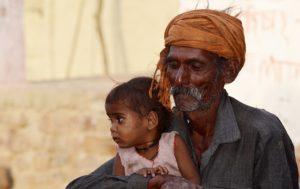
The Gospel of Life
“What are human beings that you are mindful of them, mortals that you care for them? Yet you have made them a little lower than God, and crowned them with glory and honor.” ~Psalm 8:4-5
“I came that they may have life, and have it abundantly. ‘I am the good shepherd. The good shepherd lays down his life for the sheep.’” ~John 10:10-11
There are a few novels on a list of books I call my “once-a-year list,” which is exactly what it sounds like, books that I read once every year. One is The Power and the Glory, a novel by British novelist and Catholic-ish author Graham Greene. The Power and the Glory tells the story of the last remaining Priest in a Southern Mexican state that has been overrun by a violent Marxist regime, which made killing priests a top priority. Yet, the protagonist is no hero. He is left alone until the bitter end because he is a “whiskey priest,” a drunk so ineffective in his ministry that he is easily ignored. For the sake of due diligence, however, the Police tasked with killing priests must eliminate him, and this task drives the plot.
In one moving scene our whiskey priest hides in a graveyard, only to realize that many of the crosses, statues of saints, and the Virgin Mary, along with any other remaining Christian symbol have been smashed, and the graves desecrated by Marxist enthusiasts. It is here that he ruminates on the horrific “fury to deface” that came with the violent revolution that sent him on the run. It is a violence grounded in a rejection of God, in the Priests’ mind, so the violence was extended to the image-bearers of God themselves, those still living and those lying in repose in the graveyard. “If God had been like a toad, you could have rid the globe of toads, but when God was like yourself, it was no good being content with stone figures– you had to kill yourself among the graves.”
In last week’s Compass, I began to lay out foundations for principled Christian engagement with political and public life; an engagement grounded on the life, death, and resurrection of Christ our Lord. Continuing with this theme, I would like to briefly discuss the principle of what some have called the “Gospel of life,” in response to the ease and carelessness with which so much life is taken, diminished, and destroyed.
We in the West have been slowly and deliberately rejecting God for some time. The history of how we reached this point is too expansive to cover in this compass, but the fruits of our rejection of God are being felt acutely in the public and political struggles in our county. Of course, God is not like a toad, as the whiskey priest knew. God is like us because, what is more to the point, we have been made like God: created in God’s image, filled with God’s Spirit, redeemed by God’s Son. So it should come as no surprise that a culture that rejects God acts that rejection out through violently harming and killing God’s image-bearers.
The Christian Gospel is a Gospel about life. Through Christ Jesus we are, quite literally, given new lives; here, now, and into eternity. Sensing the waning influence of this crucial element of Christian belief in the mid-1990s, Pope John Paul II wrote a Papal Encyclical that has been deeply influential in my thinking on this topic called Evangelium Vitae (The Gospel of Life). In it, he warns of the devaluing of human life he witnessed in the growing ease of access to abortion, assisted suicide, the poor treatment of the elderly and infirm, and so on; and challenged the Church to stand against these evils. One of the fundamental questions addressed in Evangelium Vitae is this: what is our starting point for understanding the worth of the human person?
It must be that “God so loved the world that he gave his only begotten Son,” for each and every person. God not only wonderfully creates each and every one of us (attested to in Psalm 8) but far more wonderfully restores us in Christ Jesus (Jesus is the good shepherd who gives his life for the sheep).
Old Man with a Baby Girl – © Yann Forget / Wikimedia Commons / CC-BY-SA, 2018.
Is there a political party, or political perspective in our country, or in the world, which adopts this starting point as their own when grappling with questions that impact sacred human life? I hope I am not saying too much when I say that I honestly do not believe so. The taking of a human life in utero, the accidental or purposeful death of a black man at the hands of a police officer, the death of a police officer ambushed by violent radicals, the death of an Octogenarian whose life is considered dispensable because keeping that person alive would cost too much money, or the death of a migrant or refugee on the border considered dispensable for political reasons; these deaths share much in common. They are all unjust deaths in the eyes of God, they are all proof that our society does not stand on the foundation of the Gospel of Life, and they are all implicitly or explicitly accepted as permissible by diverse political factions in our country.
What are Christians to make of this? There is reason for hope when God’s people do the opposite of what God says he hates in Isaiah 5:20, and call good “good,” and evil “evil,” and are compelled to cry out for God’s forgiveness and mercy when they come to understand their own complicity in it. Cynical as it may sound, the Church’s political task in this day and age is to know what is true, to say what is true, and point to another way, another kingdom, another king.
Fr. Matt

